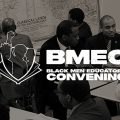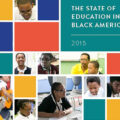
By Constance Garcia-Barrio
Guests at the sold-out sixth National Black Men in Education Convening (BMEC) packed several floors at Loew’s Hotel in Center City from November 16 to 18 this year. The conference brought together stellar teachers, administrators, policymakers, politicians, and other professionals to grapple with the pressing issue of training, recruiting, hiring, and retaining Black teachers, especially men.
BMEC, the country’s largest convening of Black men in education, also drew conferees from Germany, the Virgin Islands, and Ghana.
For Sharif El-Mekki, the leading light behind BMEC and founder and CEO of the Center for Black Educator Development, an organization that promotes racial justice in education, the conference helped to settle an old debt.
“Everything in life has a tax on it,” El-Mekki said. “BMEC is a way to pay the tax on the mentoring, encouragement, and help I received.”
It’s also a way to help correct the country’s skewed public education system. Black men make up only 1.4% of educators nationwide, according to El-Mekki. Experts and practitioners at BMEC will hasten change in the educational ecosystem, he said.
School districts clamor for Black teachers but avoid the work of confronting the racism that makes schools toxic for teachers of color, El-Mekki said. BMEC conferees can help redress that situation, which requires urgent attention.
“Research shows that Black boys who had at least one Black teacher are up to 39% less likely to drop out of school,” El-Mekki said. “Black students who have two Black elementary school teachers are 32% more likely to go to college.”
In a stirring talk that closed the first day’s program, Dr. Marc Lamont Hill, owner of Uncle Bobbie’s Coffee & Books and a professor at City University of New York’s (CUNY) Graduate Center, asked the audience to consider the power of imagination in putting the nation’s educational system on an equitable, racially just course.
Imagination allows us to stand against the strictures of the past and present, he said. As things are, many schools advance the interest of a state that funnels Black students toward incarceration.
“Students have to pass through metal detectors,” Hill said. “They walk down narrow hallways and must move when a bell sounds. We are literally training Black children for [an incarcerate] state.”
Black male teachers, principals, and superintendents would change that situation, Hill believes. School systems have also created more ways that children and their parents can be punished.
“If our kids don’t attend school we can be locked up,” he said. “But maybe the kids can’t go to school because they’re homeless.”
Bringing about change calls for taking a bold stance.
“No people [have] ever gotten anywhere by following the damn rules,” Hill said.
Finally, Hill invited conferees to imagine what the world and schools would look like if everyone had their needs met.
Panels throughout the three days pinpointed problems Black school children face. The educational testing industry has been used as a weapon against Black children, one panelist said, noting that tests are structured in ways that exclude the experience and training of students of color.
“We need to challenge the merits of those assessments,” the panelist said. “We need to get away from defining our students’ gifts by principles that weren’t created by us.”
Another panelist, who worked as a teacher’s aide before becoming an educator himself, pointed out the value of offering paraprofessionals a pathway to becoming teachers.
Workshops covered curriculum, instruction, student support, policy-making, mental health, parental engagement, and more. Lisa Marie Wilson, director of equity and outreach for Zero to Three, a nonprofit headquartered in Washington, DC, that trains early childhood providers, led a workshop on helping Black boys get off to a good start in school.
“It’s a critical matter,” she said. “We have two-year-olds being suspended from preschool,” Wilson said.
Culturally conscious teachers can smooth the way for Black boys’ success, according to Wilson. She emphasized the importance of treating the language in children’s homes as an asset that they bring to the classroom, even if it’s not standard English or when it’s another language entirely.
One workshop participant added that when you learn young people’s slang, it makes you an insider in their community. That positions you to intervene in difficult situations, he said.
Wilson also stressed how understanding racism, classism, sexism, ableism, homophobia, xenophobia and other systems of oppression hamper children, and she offered tips on how to help our children succeed.
“Make sure that there is representation of culture in the home,” she said. “This could be music, games, cooking, and sharing recipes and books by Black authors. She also urged attendees to praise and encourage our children to bolster their spirits. Finally, she urged everyone present to be part of an extended community of elders and others who value and love our children.
Besides the range of workshops, BMEC proved a networking gold mine for participants. Michele Foster, a professor in the Department of Early Childhood and Elementary Education at the University of Louisville, attended the gathering. Foster wrote “Black Teachers on Teaching,” a pioneering 1997 book with accounts of philosophies of teaching Black children.
“I’m here to learn,” Foster said. “All kinds of stuff is going on [in teaching]. I spoke with a woman who wants to start a demonstration school in North Carolina. I want to know about these things—, learn how I can help.”
Carl Jones, a support coach at the Center for Male Engagement at the Community College of Philadelphia, was attending to learn about recent developments.
“At the Center, we’re working to give our young brothers the tools they need to position them to succeed,” Jones said. “I’m here to network, to learn about the best practices.”
Stay tuned. The Center for Black Educator Development has programs to give prospective teachers classroom experience. To learn more about these opportunities and other center activities, please visit: www.theCenterBlackEd.org.
















Leave a Comment